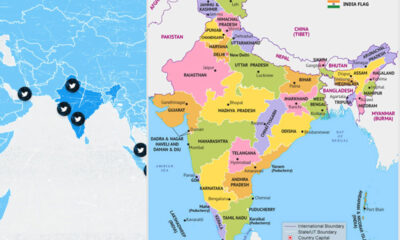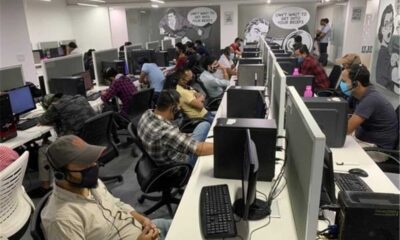Cyber Crime
Decoding the Menace of Fake Call Centre Scam & How It Is Harming India

By Shashank Shekhar in New Delhi: Believe it or not but fake call centres have become a full-fledged business in India with each units earning anything between Rs 5-20 lakh per day, depending upon the size of the set-up. These scammers are mostly cheating people staying in foreign countries by posing as tech support, insurance agent, law enforcement officer or bank officials.
So where is the problem, they are not cheating Indians and they are giving employment to young students? That is exactly where the problem lies. These scammers have done irreparable damage to India’s image globally. From being called the land of snake charmers India is now being identified as the hub of calling scam. India’s fake call centres have duped thousands of people living abroad specially in the United States and European countries.
The problem has grown so much that federal agencies of foreign countries are asking Indian law enforcement agencies to take action.
The420.in spoke to Dinesh O Bareja Cyber Security Specialist & V-CISO, YouTuber Karl Rock and cyber expert Govind Ray to understand how deep are the roots of such scams and how this menace can be ended.
Experts Opinion:
Explaining the origin of fake call centres, Bareja said the scam is highly prevalent and was flagged many years back by a US-based researcher. “Fake call centres have been busted in Thane and NOIDA earlier but seeing these new operators it is still thriving and criminal operators will find this to be a highly lucrative line of business.
Karl Rock who is from New Zeland shared his personal experience. “My own Grandmother in New Zealand lost ₹30,000 to tech support scammers in 2019,” he said.
Rock, who has been pro-active on YouTube and exposes such shady calling dens in Delhi said, “Scam calls are number 1 fraud happening to Americans who lost more than 667 million USD to them in 2019 alone. That’s only in the US, you have to also add money stolen from Canada, Australia, New Zealand, and UK too.”
Govind who has been helping Karl in exposing fake call centres explained the economics behind the scam. “Such Scam call centres operating so confidently are a huge issue at the current time. The daily revenue being created by an average call centre having 40-50 employees goes around Rs 8 -10 lakh a day. And there are many such call centres functioning across the country.”
Govind recent conducted three sting operations and exposed how these fraudsters are recruiting youngster to mint money. “The bigger issue is that students are getting attracted to such call centres just because the salary given here is more than the average salary of an engineering graduate in an MNC.”
Role Of Law Enforcement Agencies: It cannot be denied that the police has not acted against calling scammers. Fake call centres were earlier limited to Delhi NCR and Mumbai region, but lucrative business, no local complainant and police inaction helped them mushroom in other parts of the country as well.
Karl who has been following these calling centres for quite long and has been actively working with police in busting their network believes that Indian Cyber Cells don’t take scam call centres seriously because it’s easy to ignore as the victims aren’t Indians. I also think they simply don’t have the resources to fix the problem as it’s become so big because of their in-action over the years.
Having a similar view, Bareja said that cops have to accept that such operations are criminal operations. It seems that our LEA does not consider this international scam to be a crime because no one has lost money here or filed an FIR.
“Action has been taken only after a foreign agency has come in. Our police should realize that this leads to a loss of national reputation. The western media is already insulting the country using slurs based on rapes, caste, dowry etc and India does not need to be called the cyber scam center of the world,” Bareja explained.
Govind who assists police in cracking cybercrime cases claims that local police is overburdened and even lack resources. “Police has too much work. There are regular complaint plus special investigation. They are expected to work on every single case they get. I believe ignorance towards these call centres is because of work pressure and low manpower,” he added.
How To Keep A Check:
Bareja has a comprehensive plan involving all agencies coming together to keep a check. “Telecom operators, local police, municipal offices all have to share information. Municipal authorities issue commercial licenses and can identify all call centres – legal and illegal. Local police can identify such establishment while on the beat. Telecos can flag large data consumers as well as cell phone or VOIP activity which can help investigating agencies to identify such businesses,” he said.
He suggested that the government should publicize such arrests and also create awareness among young job seekers. The message should be to beware of such operators as they may also be arrested and mess up their lives.
Karl suggested a dedicated technical unit for action. “A special scam call centre task force is required – especially in Delhi and Kolkata. The problem is so big that it may need to be managed at a national level by the CBI,” he said.
“I also think foreign banks should be the ones to fund this special task force because it seems resources is already an issue in Cyber Cells – else we wouldn’t have this problem to start with,” Rock said.
Govind shared similar views and said the only solution is to have a separate wing including officers that are technically sound and the ones who are perfect at the documentation part. It’s very easy to find these call centres, all it needs is a dedicated team working solely towards it.

















